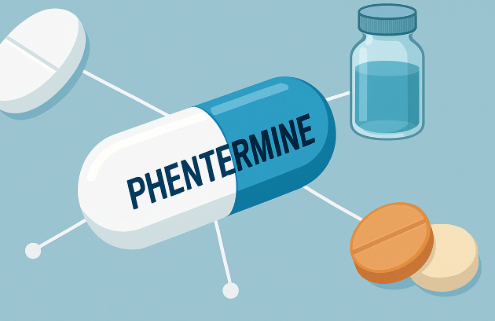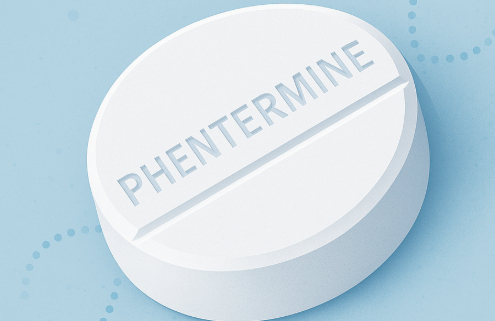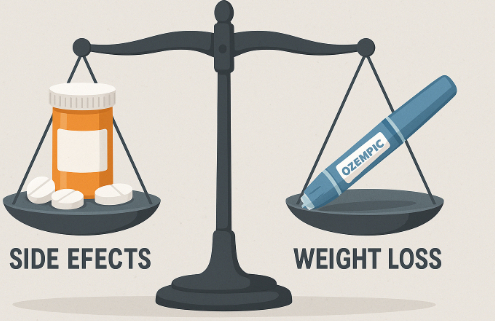Phentermine for Weight Loss
If you’ve been exploring options for weight loss, you’ve probably come across phentermine.
It’s one of the most well-known prescription medications designed to help certain individuals struggling with obesity or significant weight challenges. Phentermine is a well-known prescription medicine for weight loss.
Phentermine works as an appetite suppressant, helping to reduce hunger and potentially making it easier to follow a lower-calorie diet. Phentermine is used to speed weight loss in overweight individuals, especially when combined with diet and exercise.
When paired with healthy eating and regular exercise, it can be a promising tool to jumpstart your weight loss journey.
In this weight loss drug resources page, SANE MD will cover everything you need to know about phentermine from how it works and its benefits to the side effects and safety tips.
Whether you’re thinking about using phentermine or are already prescribed it, this page will provide the information you need to make informed decisions about its use.
What is Phentermine?
Phentermine is a prescription medication that belongs to a group of drugs known as sympathomimetic amines. It is part of a category of medications called anorectics, which function by suppressing appetite.
It’s primarily used as a short-term option to assist with weight loss by reducing appetite and increasing energy levels.
Phentermine is typically prescribed for individuals with an initial body mass index (BMI) of 30 kg/m2 or greater or for those with a BMI over 27 who also have other weight-related health issues, such as high blood pressure or type 2 diabetes.
Sometimes, phentermine is combined with topiramate to enhance weight loss effects.
The way phentermine works is pretty straightforward—it stimulates the central nervous system, which increases your heart rate and blood pressure.
As a result, hunger signals in the brain are reduced, and certain individuals tend to feel full more quickly.
This potentially makes it much easier to stick to a calorie-controlled diet without feeling constantly hungry.
It is important to contact a doctor immediately if any serious side effects occur.
How Does Phentermine Work?
Phentermine is a central nervous system stimulant that plays a crucial role in helping individuals lose weight.
It works by stimulating the release of norepinephrine, a neurotransmitter that helps regulate appetite and metabolism. However, phentermine affects alertness and coordination, which can pose risks while driving or performing activities that require focus.
By reducing hunger and increasing feelings of fullness, phentermine potentially makes it easier for certain individuals to consume fewer calories.
Additionally, it boosts energy expenditure by stimulating the body’s thermogenic processes, which helps burn more calories.
This dual action of appetite suppression and increased calorie burning makes phentermine a promising tool for weight loss when combined with a healthy diet and regular exercise.
When compared to Phentermine alternatives, this mechanism is favorable for a good portion of the population.
Benefits of Using Phentermine for Weight Loss
So, what makes phentermine so promising for weight loss?
Here are some key benefits:
- Curbs Appetite: Phentermine’s primary job is to reduce hunger, which can make it much easier to eat less and stick to a low-calorie meal plan.
- Boosts Metabolism: By raising energy levels, phentermine helps increase metabolism, potentially allowing you to burn more calories throughout the day, even when you’re at rest.
- Improves Weight-Related Conditions: For those dealing with weight-related health issues like high cholesterol or high blood pressure, losing weight with phentermine may significantly improve these conditions over time. Phentermine can also help with weight-related medical problems such as type 2 diabetes and high cholesterol.
- Short-Term Solution: Phentermine is typically prescribed for short-term use (about 8–12 weeks). During this time, it can potentially give your weight loss efforts the jumpstart they need, especially if you’ve struggled in the past.
Phentermine Dosage and Administration
Phentermine is typically taken orally once daily, usually in the morning, with or without food. The standard adult dose is 37.5 mg, but your doctor may adjust this based on your individual response and overall health.
It’s important to know your Weight Loss Drug Type (quiz here), adhere to the dosage instructions given by your healthcare provider, and not surpass the recommended dose.
Taking more than the prescribed amount can increase the risk of side effects and reduce the medication’s effectiveness.
Always adhere to your prescription label and consult your doctor if you have any questions or concerns about your dosage.
Precautions and Contraindications
Important considerations before starting phentermine:
Before starting phentermine, it is essential to consider several precautions and contraindications to ensure safe and effective treatment. Phentermine is a controlled substance and should only be used under the guidance of a healthcare professional. Individuals with a history of heart disease, high blood pressure, or other cardiovascular conditions should not take phentermine. Additionally, those with an overactive thyroid gland, glaucoma, or a history of drug abuse should avoid using phentermine.
It is also crucial to inform your doctor about any medications you are currently taking, including prescription and over-the-counter medications, vitamins, and herbal supplements. Phentermine may interact with certain medications, such as selective serotonin reuptake inhibitors (SSRIs) and monoamine oxidase inhibitors (MAOIs), which can increase the risk of adverse effects.
Pregnant or breastfeeding women should not take phentermine, as it may harm the unborn baby or pass into breast milk. Furthermore, individuals with a history of uncontrolled high blood pressure, severe agitation, or nervousness should not use phentermine.
Potential Side Effects, Including High Blood Pressure
Like any medication, phentermine isn’t without side effects. Increased blood pressure is a common side effect of phentermine, and users should seek immediate medical attention for symptoms indicating elevated blood pressure. While it works well for many people, it’s important to be aware of potential reactions that may occur while taking it.
Some of the most common side effects include:
- Dry Mouth: A lot of people experience dry mouth, but drinking plenty of water can help alleviate this discomfort.
- Increased Heart Rate: Phentermine can raise your heart rate, so it’s essential to monitor how you’re feeling and speak to your doctor if this becomes a concern.
- Difficulty Sleeping: Because phentermine is a stimulant, taking it too late in the day can lead to insomnia. To avoid this, it’s best to take the medication in the morning.
- Feelings of Anxiety: Some users may feel anxious or jittery, especially during the early stages of using the medication.
- Digestive Problems: Mild gastrointestinal issues like constipation or diarrhea can happen in some cases.
Individuals with a history of drug abuse should avoid using phentermine due to potential risks and serious side effects.
Before starting phentermine, take this Weight Loss Drug Type Quiz and make sure to discuss any concerns or pre-existing health conditions with your doctor to ensure it’s a good fit for you.
Factors That Affect Weight Loss on Phentermine
Several factors can influence how much weight you may potentially lose while taking phentermine:
- Age, Sex, and Current Weight: Younger individuals often lose weight more quickly than older adults, and men tend to shed pounds faster than women. Additionally, those with a higher starting body weight may see more rapid initial weight loss.
- Lifestyle and Diet: Phentermine is most promising for weight loss when combined with a reduced-calorie diet and regular exercise. Adopting healthy lifestyle changes, such as eating a balanced diet and staying physically active, can potentially enhance your weight loss results.
- Dosage: The correct dosage is crucial for weight loss. Taking too little may not yield the desired results, while taking too much can increase the risk of side effects.
- Individual Response: Everyone’s body reacts differently to phentermine. Certain individuals may experience significant weight loss, while others may see more modest results.
- Medical Conditions: Conditions like high blood pressure, diabetes, and thyroid disorders can impact weight loss on phentermine. Managing these conditions effectively may require dosage adjustments or additional medications.
- Medication Interactions: Phentermine can interact with other medications, including other weight loss drugs, potentially reducing their effectiveness. Always inform your doctor about any other medications you are taking.
Working closely with your healthcare provider to monitor your weight, blood pressure, and overall health is essential for safe weight loss on phentermine.
Regular check-ins will help ensure that your treatment plan is tailored to your individual needs and that you achieve the best possible results.
Monitoring and Follow-up
Regular check-ins and assessments:
Regular monitoring and follow-up appointments with your healthcare provider are crucial when taking phentermine. Your doctor will need to assess your response to the medication, monitor your blood pressure, and check for any potential side effects.
During these appointments, your doctor may:
- Monitor your weight loss progress and adjust your treatment plan as needed
- Check your blood pressure and heart rate to ensure they are within a safe range
- Assess your overall health and well-being, including any potential side effects or adverse reactions
- Review your medication regimen and make any necessary adjustments
It is essential to keep all scheduled appointments and follow your doctor’s instructions carefully to ensure safe and effective treatment with phentermine.
Tips for Safe Phentermine Use
Using phentermine safely is key to getting the most benefit with the least risk.
It’s important to note that phentermine is a controlled substance, which means it has the potential for misuse and dependence and should be used only as directed.
Here are some essential tips to help you make the most out of this medication:
- Follow Your Prescription: Always take phentermine exactly as prescribed by your doctor. Never increase the dosage or use it for longer than recommended without consulting your healthcare provider first.
- Incorporate Healthy Habits: Phentermine should be used alongside a balanced diet and regular exercise. It’s not a magic pill—making lifestyle changes is crucial to achieving lasting weight loss.
- Stay Hydrated: Drinking plenty of water throughout the day will not only help manage side effects like dry mouth but also support your overall metabolism.
- Take It Early: Since phentermine can cause sleeplessness, it’s best to take it earlier in the day to avoid nighttime restlessness.
- Watch for Side Effects: Keep an eye out for any new or worsening side effects. If something feels off, contact your doctor for advice.
- Missed Dose: If you miss a dose, skip the missed dose and take the next dose at the normal time. Do not double up to make up for the missed dose.
Storage and Disposal
Proper handling of phentermine:
Proper storage and disposal of phentermine are crucial to prevent misuse, accidental ingestion, and environmental contamination. Here are some guidelines to follow:
- Store phentermine in a cool, dry place, away from direct sunlight and moisture
- Keep phentermine out of reach of children and pets
- Store phentermine in its original container, tightly closed, and with the prescription label intact
- Do not share phentermine with others or use someone else’s phentermine
- Dispose of unused or expired phentermine by taking it to a medication take-back program or by mixing it with an undesirable substance, such as coffee grounds or cat litter, and disposing of it in a sealed container
By following these guidelines, you can help prevent misuse and ensure safe handling of phentermine.
Long-Term Considerations and Alternatives
Phentermine isn’t designed for long-term use.
After 12 weeks, it’s time to shift focus to sustainable lifestyle changes that will help you maintain your weight loss.
Some people may transition to other weight management solutions, such as long-term dietary plans, behavioral therapy, or even other medications if necessary.
Additionally, other weight loss medications, in conjunction with lifestyle changes, can be part of a comprehensive weight loss strategy.
There are also alternative treatments to phentermine, like Qsymia, which combines phentermine with topiramate.
For those who prefer non-pharmaceutical options, supplements and lifestyle changes can be explored, and bariatric surgery may be an option for some individuals.
FAQs About Phentermine
Understanding how phentermine works, its benefits, and how to use it safely is crucial for anyone considering this medication.
Below are some of the most common questions people have about phentermine, along with detailed answers to help guide you through the process of using it effectively and safely.
1. How long does it take to see weight loss with phentermine?
Most people notice weight loss within the first few weeks of taking phentermine, especially when combined with healthy eating and exercise.
The rate of weight loss varies depending on several factors, such as one’s Weight Loss Drug Type (quiz here), individual metabolism, and how closely one follows their diet plan.
Typically, phentermine is prescribed for 8-12 weeks, during which users potentially see steady progress if they stick to the program.
Keep in mind that phentermine is a tool to help get you started, but maintaining a balanced lifestyle is essential for long-term success.
2. Is it safe to drink alcohol while on phentermine?
It’s generally advised to avoid alcohol while taking phentermine. Alcohol can amplify certain side effects, such as dizziness, increased heart rate, or nervousness.
Additionally, alcohol might interfere with your weight loss efforts by increasing your appetite or lowering your willpower to stick to a healthy eating plan.
For your safety and to maximize the benefits of the medication, it’s best to steer clear of alcohol or discuss occasional use with your healthcare provider.
3. Who should avoid taking phentermine?
Phentermine isn’t safe for everyone. People with a history of heart disease, uncontrolled high blood pressure, or thyroid issues should avoid using phentermine due to potential risks.
It’s also not recommended for pregnant or breastfeeding women.
Before starting phentermine, your healthcare provider will evaluate your overall health and determine whether it’s the right option for you.
Make sure to let your doctor know about any other medications you are currently taking to prevent any potentially harmful interactions.
4. How often can I take phentermine each day?
Phentermine is usually prescribed as a once-daily medication, typically taken in the morning.
Taking it later in the day could interfere with your ability to sleep due to its stimulant effects. Be sure to follow your doctor’s dosage instructions carefully.
If you feel like the current dosage isn’t working as expected, talk to your healthcare provider before making any changes.
Adjusting your dose on your own could increase the risk of side effects.
5. What happens if I suddenly stop taking phentermine?
Abruptly stopping phentermine after prolonged use could lead to withdrawal symptoms, such as fatigue, mood swings, or even depression.
It’s essential to consult your doctor before discontinuing the medication. They can guide you on how to taper off gradually to avoid these symptoms.
Additionally, developing a post-phentermine weight maintenance plan will help you continue the progress you’ve made without relying on medication.
Transitioning to a combination of phentermine and topiramate can be an alternative treatment option for certain individuals.
Conclusion
Phentermine can be a promising option for short-term weight loss when used correctly and combined with a healthy lifestyle.
It’s essential to know your Weight Loss Drug Type (quiz here), follow your doctor’s advice, and make sustainable changes to your diet and exercise routine to ensure lasting success.
As always, consult with a healthcare professional to see if phentermine is the right option for your weight loss journey, and use it safely to achieve the best possible results.
References
https://www.phentermine.com/
https://welltech.com/content/phentermine-for-weight-loss-who-can-it-be-prescribed-to-and-why/
More Phentermine Resources:










